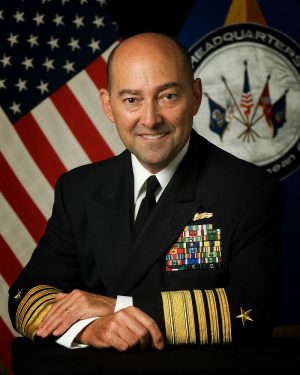
In the latest escalation of his war crimes against Ukraine, Russian President Vladimir Putin has pulled out of the painfully negotiated grain deal that for months has permitted exports of Ukrainian and Russian agricultural products from Black Sea ports.
There are several reasons for Putin's withdrawal: frustration at Western sanctions; concern over Ukraine's modestly successful counteroffensive; and anger at the Ukrainians' bold strike on the symbolically and logistically important Kerch Strait bridge that connects Russia to occupied Crimea.
In addition to ending Russian participation in the grain deal — which was brokered with the aid of the United Nations and Turkey — Putin said he may begin attacking grain ships still plying the international waters of the Black Sea. This will make it very difficult, if not impossible, for shippers of grain and other agricultural products to obtain insurance — effectively creating a blockade.
Under international law, such blockades are illegal. There is no state of declared war between the parties (recall this is, in Putin's own words, merely a "special military operation") and it would directly curtail freedom on the high seas. Putin is also weaponizing hunger by cutting food supplies to North Africa and other parts of the global south. Ukraine is among the world's largest exporters of several key grains, fertilizers and flower oils.
How can the West respond to Putin's actions? And what might he do in return?
For starters, the U.S. can learn from its own history. More than 30 years ago, then-Lieutenant Commander James Stavridis (with a lot more hair) was assigned as operations officer on a new U.S. Navy Aegis cruiser, the Valley Forge. We were part of Operation Earnest Will, which helped resolve an Iranian attempt to close the Strait of Hormuz and thus cut off 25% of the world's hydrocarbon shipping. That successful mission provides a rough blueprint of how to break an illegal blockade today.
In the Gulf in the late 1980s, Washington took the extraordinary step of "re-flagging" Kuwaiti oil tankers — putting them under American registration — to make them in essence U.S. assets. We then set up a complex command-and-control system across the waters of the Gulf and — to use a basketball analogy — provided both zone and man-to-man defense arrangements: generally moving the ships in convoys, but occasionally assigning individual warships to protect individual tankers, depending on the situation.
Fast-forward to the present. On the plus side, because of the humanitarian nature of the cargoes, it might not be necessary to fully re-flag the Black Sea vessels. The rationale for the escorts would essentially fall under the broad provisions of international law that permit enforcing the freedom of international waters, and also allow the protection of humanitarian shipping in conflict zones.
Unfortunately, the U.N. wouldn't be able to take a lead role, because of Russia's ability to veto anything coming out of the Security Council. So the mission would likely be undertaken either by the North Atlantic Treaty Organization or by a "coalition of the willing" led by the U.S.
Operationally, a structure along the lines of Earnest Will makes sense. Assuming this is a NATO mission, the main assets would be two standing maritime combat groups overseen by my latest successor as the alliance's supreme allied commander, U.S. Army General Chris Cavoli. He would probably delegate execution to the four-star commander of NATO's southern forces, based in Naples, Italy.
Fortuitously, one of the standing maritime groups is composed of minesweepers, which will be very necessary given Russia's continued laying of sea mines near Ukraine's ports. The other maritime group, currently under the command of a British commodore, is typically composed of six frigates and destroyers, with plenty of firepower and air-defense capability. Likely, the HQ in Naples would install a three-star commander for the task force as a whole, possibly from the U.S. Sixth Fleet in the Mediterranean.
How would it work? Probably by bundling the merchant craft into three-to-five ship convoys, each escorted by a couple of guided-missile warships. There would be a significant air component to carry out patrols tracking the location of the Russian Black Sea Fleet — which operates largely out of ports in occupied Crimea — and to respond to possible Russian air attacks on the ships. Several squadrons of fighters could be assigned to NATO bases in northern Turkey or, more likely, Romania and Bulgaria. Satellite command-and-control would be necessary; air and naval drones could be integrated.
Obviously, all this would be terribly complex and risky. In terms of complexity, I am confident NATO (or a coalition formed by the U.S., U.K. and their Black Sea partners) could handle such a defensive military operation. The risk is obvious: It would bring Russia and Ukraine's Western supporters into direct confrontation, if not necessarily combat. It would be crucial, before starting the mission, to give a public explanation of its intent and scope, making clear to Russia that we are not looking for a fight but will do what we must to defend the convoys.
There are other risks as well. Turkey, which controls passage to the Black Sea, might prove politically reluctant to cooperate. And there is the possibility of an inadvertent incident of "collateral damage" — as with the terrible downing of an Iranian commercial airliner during Earnest Will.
Putin would fume, sputter and threaten — but is unlikely to take on NATO or a U.S.-led coalition of Black Sea warships in direct combat. He would be well served to see how things turned out for Iran in the 1980s: multiple warships sunk, and a broken blockade. Convoys, anyone?
(COMMENT, BELOW)
Stavridis is a Bloomberg columnist. He is a retired U.S. Navy admiral and former supreme allied commander of NATO, and dean emeritus of the Fletcher School of Law and Diplomacy at Tufts University. He is also an operating executive consultant at the Carlyle Group and chairs the board of counselors at McLarty Associates.
Previously:
• 07/28/23 Sweden and Finland give NATO an Arctic opportunity
• 07/11/23 US military's recruiting woes are a national-security crisis
• 06/02/23 Ukraine war may become a proving ground for AI
• 05/16/23 Iran's tanker seizures may bring U.S. convoys back to the Gulf
• 05/08/23 Sudan rescue mission is helping the US Navy prepare for war
• 05/01/23 Ukraine is running out of ammo. So is the US
• 03/10/23 The US military must create a Cyber Force
• 12/07/23 Putin will carpet-bomb Ukraine unless the West acts
• 10/14/22 Putin's campaign of terror from the air is already failing
• 09/08/22 Iran reveals how its naval warfare is changing
• 08/02/22 US needs a global alliance against Russia's cyberattacks
• 06/28/22What to expect from NATO's new strategic concept
• 04/13/22 Nukes? Ukraine war's most potent weapon may be a cell phone
• 01/18/22 Russia is pushing Finland and Sweden toward NATO
• 10/20/21 What Colin Powell taught me about war and optimism
• 09/14/21 Why the U.S. Navy is hunting pirates off Africa
• 07/29/21 Cuba and how Biden can avoid another Mariel boatlift
• 07/01/21 Donald Rumsfeld never gave in
• 02/16/21 Keeping troops in Afghanistan makes America safer
• 08/19/20 Military reasons to celebrate the Israel-UAE deal
• 07/02/20 Taliban bounties would be a new low even for Putin
• 01/02/20 May the 'Space Force' be with you
• 08/02/19 What Iran will do next, and how to stop it
• 05/06/19 The 'Five Eyes' intelligence-sharing alliance should expand, starting with Israel and Japan
• 04/24/19 Sri Lanka attacks mark the birth of terrorism 3.0
• 01/14/19 Iran's tiny navy is trying to revive the Persian Empire
• 06/04/18 US was right to give China's navy the boot
• 06/04/18 Big winner of Colombia's election is the US
• 05/17/18 Great power politics is back as U.S. aims at Russia with resurrected Navy fleet
• 03/20/18 Fake advice for Putin's fake win


 Contact The Editor
Contact The Editor
 Articles By This Author
Articles By This Author